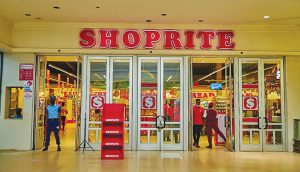BLOOMBERG
Shoprite Holdings Ltd lamented chronic electricity shortages in its home market of South Africa that held back growth in first-half profit and capped gains in the dividend payout.
The owner of chains including Checkers and U-Save spent 465 million rand ($25 million) more on diesel in the six months through January 1 to ensure power during regular rolling blackouts. The extra costs eroded margins in the core South African supermarket business, Cape Town-based Shoprite said.
“We are disappointed that as a result of the diesel expense, to mitigate the impact of load-shedding during the period, we are not reporting the level of profit and dividend growth normally associated with such a notable achievement in terms of sales growth,†Chief Executive Officer Pieter Engelbrecht said.
State power utility Eskom Holdings SOC Ltd has imposed rolling blackouts for 128 consecutive days, forcing grocers like Shoprite to fire up generators to protect cold chains. South African President Cyril Ramaphosa appointed the country’s first electricity minister to address a crisis that caused a deeper-than-expected contraction in the economy in the final quarter of 2022, according to data.
While Shoprite’s first-half net income surged 20% and trading profit at South African supermarkets rose 7.7% to 5.4 billion rand, trading margins at the unit slid to 6.3% from 6.9%. Africa’s largest grocer declared an interim dividend of 2.48 rand per share, up from 2.33 rand a year earlier.
Not all the retailer’s diesel generators are new and they are being used more regularly than envisaged when installed, Chief Financial Officer Anton de Bruyn said in a presentation. This means the company will soon need to replace older units, he said.
The grocer’s shares dropped as much as 6.3%, their sharpest decline in more than three months, before recovering to be 0.5% lower in Johannesburg. Shoprite has slipped 0.9% this year, compared to a gain of 7.8% in the FTSE/JSE Africa All Shares Index.
The retailer still expects to open 238 stores in the second half, the bulk in South Africa, and is on track for 512 new stores across the group in the year through June. That’s as it drives sales to low-income domestic customers following the acquisition of chains from Massmart Holdings Ltd.
“The ongoing cost to our economy in terms of growth and investment is devastating,†Engelbrecht said, referring to the national power cuts. “As is the impact on the everyday lives of South Africans, most of whom are already dealing with considerable hardship.â€
 The Gulf Time Newspaper One of the finest business newspapers in the UAE brought to you by our professional writers and editors.
The Gulf Time Newspaper One of the finest business newspapers in the UAE brought to you by our professional writers and editors.
